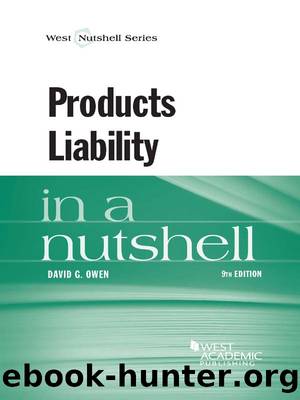Products Liability in a Nutshell by David Owen

Author:David Owen
Language: eng
Format: epub
ISBN: 9781634592123
Publisher: West Academic
Published: 2014-01-15T00:00:00+00:00
§ 8.8 THE THIRD RESTATEMENT
Products Liability Restatement § 1 provides that one who sells âa defective product is subject to liability for harm to persons or property caused by the defect.â Section 2(b) explains that a product is âdefective in designâ if:
the foreseeable risks of harm posed by the product could have been reduced or avoided by the adoption of a reasonable alternative design by the seller or other distributor, or a predecessor in the commercial chain of distribution, and the omission of the alternative design renders the product not reasonably safe.
Paraphrased, § 2(b) says:
A product is defective in design if the seller failed to reduce the foreseeable risk that harmed the plaintiff by adopting a reasonable alternative design, the omission of which renders the product not reasonably safe.
Risk-Utility
By requiring that an alternative design be âreasonable,â and basing a manufacturerâs liability on its failure to adopt such an alternative design only if its omission renders the product ânot reasonably safe,â the Third Restatement rejects absolute safety in favor of optimality: âSociety does not benefit from 270
products that are excessively safe ⦠any more than it benefits from products that are too risky. Society benefits most when the right, or optimal, amount of product safety is achieved.â Cmt. a. The risk-utility balance prescribed in § 2(b) for design defectiveness determinations ordinarily resolves into a negligence-style evaluation of the foreseeable costs and benefits of the manufacturerâs decision to forego an alternative design:
Subsection (b) adopts a reasonableness (ârisk-utility balancingâ) test as the standard for judging the defectiveness of product designs. More specifically, the test is whether a reasonable alternative design would, at reasonable cost, have reduced the foreseeable risks of harm posed by the product and, if so, whether [its] omission ⦠rendered the product not reasonably safe.
Cmt. d. The Third Restatementâs âreasonable alternative designâ requirement âis based on the commonsense notion that liability for harm caused by product designs should attach only when harm is reasonably preventable.â In making the relevant risk-utility assessments, â[a] broad range of factors may be [balanced] in determining whether an alternative design is reasonable and whether its omission renders a product not reasonably safe,â including such factors as the foreseeable risks of harm, consumer expectations, usefulness, costs, aesthetics, longevity, responsibility for the productâs maintenance, marketability, and other advantages 271
and disadvantages of both the chosen and alternative designs. Cmt. f.
A judge or jury must evaluate these factors with respect to both the accident product as designed and the alternative design feature put forward by the plaintiff. A productâs design is ânot reasonably safe,â and hence is âdefective,â if a comparison between the accident product without the plaintiffâs proposed safety feature and the alternative product with the proposed safety feature demonstrates that the balance of costs and benefits of the alternative design is better than the balance of these same factors in the accident product. And the converse is also true: if the balance of competing design considerations in the accident product without the proposed safety feature was as
Download
This site does not store any files on its server. We only index and link to content provided by other sites. Please contact the content providers to delete copyright contents if any and email us, we'll remove relevant links or contents immediately.
Grob's Basic Electronics 13th latest edition by Mitchel E. Schultz(382)
Core Data Services for ABAP by Unknown(272)
Product Cost Controlling with SAP by Unknown(255)
To the Mountain and Back: The Mysteries of Guatemalan Highland Family Life by Jody Glittenberg(232)
Genki - An Integrated Course in Elementary Japanese II - Workbook [Third Edition] by Workbook(228)
Foundations of Computational Physics: Key Concepts by Educohack Press(186)
Thermodynamics: the course of lectures by Doktorov A.B. Burshtein A.I(150)
Introduction to Control Engineering - Modeling, Analysis and Design by A.K. Mandal(138)
Northern Ireland in crisis; reporting the Ulster troubles by Winchester Simon(134)
Products Liability in a Nutshell by David Owen(126)
Scope and Standards of Practice for Professional Telehealth Nursing by American Academy of Ambulatory Care Nursing(124)
Early Netherlandish Painting, Vol. 1 by Erwin Panofsky;(116)
The Andreasson Affair: Phase Two by Raymond E. Fowler(112)
Microsoft Word - Weather Update - Copy by C&&C MARINE(109)
Care Coordination and Transition Management Core Curriculum by Beth Ann Swan; Sheila Haas; Traci Haynes(106)
Electronic Circuits and Communication Fundamentals by Team Ques10(105)
Vaccinations : A History : From Lady Montagu to Jenner and Genetic Engineering by Hervé Bazin(105)
The Oxford Companion to 20th Century Art by Unknown(101)
Seismic Isolation Strategies for Earthquake-Resistant Construction : Emerging Opportunities by Mikayel Melkumyan(101)
